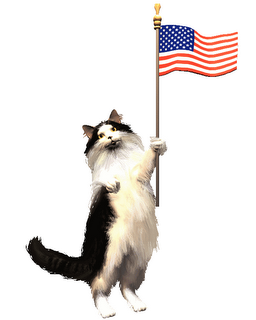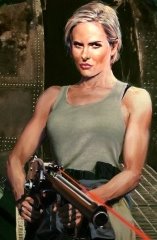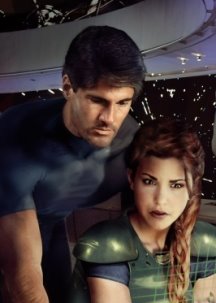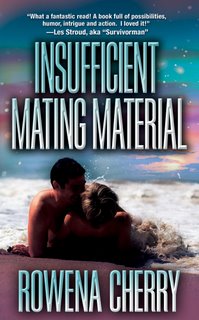If you wanted to create aliens using intelligent versions of terrestrial animals as templates, which creatures would you choose to base your ETs on? The animal generally acknowledged to have intelligence closest to human level, of course, is the chimpanzee. In fact, Jared Diamond calls Homo sapiens "The Third Chimpanzee" in his book of that title. So chimps who evolved to sapience would probably be a lot like us. We could imagine, however, a species of civilized chimpanzees who have retained their body hair and other primate characteristics, as in the "Planet of the Apes" series. Since it has proved almost impossible to teach chimps verbal speech (because of their physical limitations), these apes might communicate mainly by sign language.
What about animals other than primates? Many people believe dolphins possess a language, with intelligence comparable to ours. Dolphin-like aliens pose one problem, however, the lack of manipulative appendages. No matter how advanced they were, would we recognize them as such if they created no material artifacts? Maybe we could postulate aquatic mammals that train lesser animals to build objects and structures for them.
A prime ocean-dwelling candidate for sapience is the octopus. These cephalopods are surprisingly intelligent and have the advantage of eight flexible arms. With the potential for unlimited size in the weightlessness of a watery environment, they could grow large enough to have huge brains. If they evolved voluntary control over their ability to change color, they would have a rich medium of communication.
Elephants, which live as long as human beings, have high intelligence and complex social networks. They have voluntary control over their vocalizations. They also possess versatile, sensitive manipulative appendages -- trunks. A culture of sapient elephants would be easy to envision -- reminiscent of Babar! As for other land mammals, raccoons and bears are clever with their "hands" (in this case, paws), known to open doors and latched containers. Bears, in particular, grow large enough to potentially develop brains of a sufficient size to sustain human-like intelligence. Maybe Yogi really *is* smarter than the average bear? Land-dwelling predators such as wolves, tigers, and lions make appealing aliens. I love the idea of intelligent felinoid species like the ones in the Kzin series and C. J. Cherryh's Chanur series. But to accept these alien races as plausible, we'd have to assume some kind of evolutionary pressures causing them to develop bipedal locomotion, handlike forelimbs, and language.
Animal Planet's "Most Extreme" episode on intelligence rates the parrot Number One (although I assume they mean first among birds, not all animals; I can't believe parrots surpass apes or dolphins). Parrots, like elephants, can live a very long time. They show evidence of connecting sounds with meanings rather than just "parroting" words, and they can manipulate objects with their claws. A species of parrot-type birds grown to the size of ostriches could conceivably attain sapience.
What about social insects? A hive of bees acts almost as a single entity. Could they evolve a "group mind"? But with this speculation we reach the threshold of categories of minds so alien we might not be able to recognize them as intelligent.
When imagining Terran animals as evolved into intelligent persons, I assume their physiology, psychology, and social structures wouldn't change much. They would develop cultures suitable to their biology and environment. So they would have personalities we could somewhat empathize with but flavored with nonhuman qualities.






































